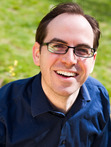Adam Szymkowicz's Blog, page 85
November 28, 2012
I Interview Playwrights Part 530: Nick Gandiello
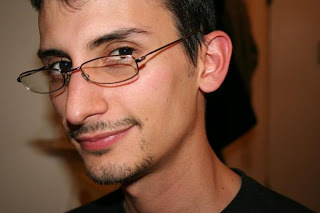
Nick Gandiello
Hometown: Baldwin, NY. Long Island.
Current Town: Harlem.
Q: What are you working on now?
A: I finished a first draft about a month ago, so now I'm in that weird place where I want to rush ahead with new ideas but should probably be a grown up and do a rewrite. To that end... I'm lucky to be participating in The New School for Drama's Alumni Project in February. We'll be doing a workshop and reading of my newest play, Black Fly Spring. It's about a young woman whose sister died on the job as a war photographer and how the aftermath affects her relationships and her views on the world.
I recently stepped into the role of Literary Manager of Young Playwrights Inc, and I'm looking forward to the readings of our National Competition winners in January. Those kids are inspiring.
And The Ars Nova Play Group's production of short plays goes up in January. We start rehearsing my play "Hip-Hop Documentaries" soon!
Q: Tell me, if you will, a story from your childhood that explains who you are as a writer or as a person.
A: After my parents split up, I went to a child psychologist. I hope he was earning my parents' money; all I remember is playing with blocks and making a wood carving of an elephant in his shop. We brought my mom and brother in once and I played therapist and crossed my legs and rubbed my chin thoughtfully and asked them stuff like "and how does that make you feel?" It didn't go well. I remember crying and yelling "I had a shell! My shell is broken!" I was like six! I think I try really hard to empathize with others, sometimes to a fault, and to give others a chance to empathize, and a lot of times I think we all need to cry and acknowledge the shell. And I'm a psychology nerd.
Q: If you could change one thing about theater, what would it be?
A: Money.
Q: Who are or were your theatrical heroes?
A: Sam Shepard, Caryl Churchill, Harold Pinter, Arthur Miller, Tennessee Williams, Paula Vogel, Eugene O'Neill, William Shakespeare, Simon Stephens, Sophocles, Seneca.
I wouldn't have become a playwright or kept on writing plays without these people:
TJ Terranova, Kevin Harrington, Jack Hrkach, Jim Utz, Laura Maria Censabella, Chris Shinn, Pippin Parker, Michael Weller, Frank Pugliese, Erin Callahan.
Q: What kind of theater excites you?
A: I'm a catharsis junkie. I want to weep openly and laugh uncontrollably. I dig psychological complexity and moral ambiguity but as long as it feels honest and it moves me, I'm good. And I go nuts over theater that lets us confront the essential stuff that is most scary to deal with in our day-to-day: mortality, sex, identity, etc.
Q: What advice do you have for playwrights just starting out?
A: I feel like I'm just starting out! But this is what I've been learning, for what it's worth:
As an artist, figure out how it is you can be most honest and embrace it. As a professional, cultivate gratitude and generosity. Writing is difficult enough, so don't punish yourself; try to eat well and sleep well. And get the pages done. Just get the pages done.
Q: Plugs, please:
A: Check out the New Voices Festival at The New School for Drama this spring for writers you should know. And next spring too!
The readings at Young Playwrights Inc in January are going to fantastic.
Anything that happens at Ars Nova should be on your calendar. Come check out The Netflix Plays in January, and all the Out Loud readings!
Ready Set Go Theatre Company and Ugly Rhino Productions are two companies I like to talk up.
And if you need a snack, check out www.kettlecornnyc.com. The original is the most popular; spicy cheddar is my favorite.







Published on November 28, 2012 06:25
November 26, 2012
Upcoming Shows--New York
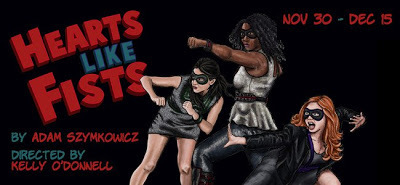
1. First up, it's Hearts Like Fists at Flux Theater Ensemble Nov 30-Dec 15 This show had the best reviews of my life this summer in LA. Now Flux is doing their version. Rehearsals are going great. Can't wait for you to see it.
directed by Kelly O’Donnell
Nov 30 – Dec 15, 2012
At The Secret Theatre
PURCHASE TICKETS AT: https://web.ovationtix.com/trs/cal/3012
THE STORY: Hearts Like Fists is a superhero noir comedy about the
dangers of love. The city’s heart beats with fear: Doctor X is sneaking
into apartments and injecting lovers with a lethal poison. Lisa’s heart
beats with hope: now that she’s joined the elite Crimefighters, maybe
she can live a life with meaning. And every beat of Peter’s wounded
heart brings him closer to death, but he’s designing an artificial
replacement that will never break. Can the Crimefighters stop Doctor X?
Do Peter and Lisa have a chance at love? And who is the girl with a face
like a plate?
Featuring: Becky Byers*, Aja Houston*, Rachael
Hip-Flores, Jennifer Somers Kipley, Susan Louise O’Connor*, Chester
Poon, August Schulenburg, Marnie Schulenburg*, Chinaza Uche*, and Chris
Wight
Creative Team: Stage Manager - Jodi Witherell, Set Design
- Will Lowry, Lighting Design - Kia Rogers, Costume Design - Stephanie
Levin, Sound Design - Janie Bullard, Fight Director - Adam Swiderski,
Assistant Fight Director - Rocío Mendez, Jennifer Somers Kipley -
Assistant Director, Emily Owens, PR - Press Relations
FLUX THEATRE ENSEMBLE: http://www.fluxtheatre.org/hearts-like-fists/
The Secret Theatre
44-02 23rd Street
LIC, NY 11101
www.secrettheatre.com
2. Then it's a slightly tweaked version of the experimental movement piece UBU we did at SoloNOVA festival at TerraNOVA last year. It sold really well so they put it in their season.
UBU
presented by
terraNOVA Collective, One-Eighth & IRT
Written by Adam Szymkowicz
Directed and Performed by Daniel Irizarry
December 4 -- 16 , Tuesday -- Sunday (Mondays dark) at 8:30pm
Ticket Price: $20.00 At IRT: 154 Christopher st. #3B (third floor)
-- Running time 1 hour.
Inspired by Ubu Roi, UBU is the King of the Great Expanding Universe
who will allow a privileged few into his mansion to watch him eat steak.
Along the way, he may play music, read you poetry and tell of his lost
loves and purchased politicians – it all depends on the mood of the
King. Join this kinetic romp through the absurdist world of the most
powerful CEO in the universe.
Don't miss the relaunch of UBU, back from a successful run for the 2012 soloNOVA Arts Festival at the New Ohio Theater.
Martin Denton from nytheatre.com said it was:
“…a monster of mammoth size and ravenous appetite, sort of like the
Tasmasian Devil on steroids by way of Monty Python's Mr. Creosote...”
http://www.nytheatre.com/Show/Review/ubu14508
And Olivia Jane Smith from New York Theatre review said:
‘…Irizarry’s singular stage presence and the productions beautifully
grotesque little world make this…expanding universe worth a good look.’
Assistant Director Laura Butler Rivera
Marketing/ Associate Producer Homa Hynes
UBU Servants - Laura Butler Rivera, Shang-Ho Huang, & Homa Hynes
Scenic Design Mikiko Suzuki Macadams
Sound Design Marcelo Anez
Lighting Design Lucrecia Briceno
Puppets and Props Frankenstudio
Costume Design Marea Judilla and Edith Raw
Stage Manager Zina Goodall
Tickets: http://www.brownpapertickets.com/event/286935
See UBU's trailer at: http://www.youtube.com/watch?v=xvSO6tb_6J0







Published on November 26, 2012 07:26
November 24, 2012
I Interview Playwrights Part 529: Tania Richard
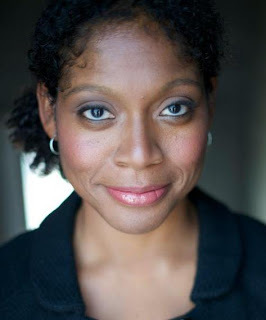
Tania Richard
Hometown: Western Springs, IL.
Current Town: Evanston, IL.
Q: What are you working on now?
A: A play called "Angry Black Woman" and a sister solo piece called "Angry Black Women" The plan is for them to debut in Evanston, IL. The solo piece will also tour.
Q: How would you characterize the Chicago theater scene?
A: It's a great city to start your career because of all the non-equity theaters that produce really solid work. This community also gives you room to reinvent yourself and have multiple careers. I am a writer, actress and teacher and I've had success in all three without having to leave Chicago.
Q: Tell me, if you will, a story from your childhood that explains who you are as a writer or as a person.
A: I started writing short stories very early. By grade school I was already carrying a notebook with me everywhere. I'd write during class instead of paying attention. I use to draw comic strips about totally mundane things like a girl getting a hair cut. Making comic strips taught me about action in playwriting. Every box had to contain an event that moved the story forward.
Q: If you could change one thing about theater, what would it be?
A: The lack of diversity in casting. As a black pIaywright some of my writing is race specific but a good deal of my writing doesn't require a specific ethnicity. In my cast descriptions I encourage non traditional casting to the point where I often write a character and specify that they are a minority even though their race has nothing to do with the character or the story. I want to see casts that reflect the diversity we see in the world. I would rather see diverse casts than "the all Black play" or the "all Asian play" It's time to stop segregating our theater.
Q: Who are or were your theatrical heroes?
A: Harvey Fierstein, Tony Kushner, Lanford Wilson, Lorraine Hansberry, Tennesee Williams. I fell in love with theatre by reading "Torch Song Trilogy" when I was in high school. I feel like Harvey Fierstein is my fairy godfather or something (no pun intended) Tony Kushner is brilliant and even though he is given his due for "Angels In America" I think people take his genius for granted. He is a master of marrying the personal and the political. If I could write like him I would be so in love with myself I'd never leave the house.
Q: What kind of theater excites you?
A: I love theatre that has a mix of the theatrical, great language (which does not mean it has to be verbose) and strong relationships. Also, I love first and second act rock 'em sock 'em endings. August Wilson has some of the best final lines in all theatre. The ending of "Fences" on Broadway knocked me off my seat. The ending of "Angels In America" was jaw dropping. I love a great final line and the lights fading to black. Good clean fun.
Q: What advice do you have for playwrights just starting out?
A: You have to allow yourself a lousy first draft. Take pleasure in how bad it is. Get all the muck out then start to revise. If you wait for the right time to have children you will never have children. If you wait to write a perfect first draft it will never get written so write crap and get on with it. Also, choose who gives you feedback wisely. Be protective of your plays.
Q: Plugs, please:
A: Currently appearing as Mrs. Cratchit in A Christmas Carol at The Goodman Theatre, my blog is http://trichard3.blogspot.com, my website is www.taniarichard.com







Published on November 24, 2012 07:09
November 21, 2012
I Interview Playwrights Part 528: Lloyd Suh
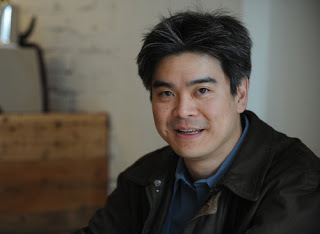
Lloyd Suh
Hometown: Greenwood, Indiana
Current Town: Brooklyn, New York
Q: What are you working on now?
A: The most immediate thing chronologically is a play called JESUS IN INDIA that is going up in February with Ma-Yi Theatre Co at the Theatre at St. Clements. It was produced at the Magic Theatre in San Francisco earlier this year, and I'm doing some big retooling for this production. I also have a play for young audiences that was commissioned by Children's Theatre Company in Minneapolis called THE WONG KIDS IN SPACE CHUPACABRA FREAK SHOW BATTLE GO! that I'm workshopping, and a play about an all-Asian country band that was initially developed in the Soho Rep Writer/Director Lab that I'm working on with NAATCO (National Asian American Theatre Company). In the earlier stages is an EST Sloan commission that looks at the inventions of Benjamin Franklin as a sort of precursor to his invention of America.
Q: If you could change one thing about theater, what would it be?
A: I like to think that any of us in fact CAN change lots of things about theater, though of course some things are harder to change than others. For me, the thing I spend most of my time and energy on has to do with just trying to make the lives of playwrights better. The challenges and obstacles that writers face are enormous and well-publicized elsewhere, and so for my day job (as a program director at the Lark Play Development Center), the work I do is about trying to provide resources - through artistic programs, community building, advocacy or financial support - that improve the type of livelihood that writers can expect to lead. At the risk of sounding sanctimonious about it, I also have to believe that what playwrights do is of incredible value to the world, as a way for us as a culture to explore what it is to be human in the way we live now, and create a conversation for a society to confront itself in the present tense. So by helping to change the way we assign value to the writers who generate that living conversation, and by enabling those voices - especially if it can be done with a multitude - is a way of changing the quality of the conversation that we're having in the world. Included in that, of course, are the big questions of who comes to see theater, who has access to it, and so there are a lot more specific things I'd like to change in that regard as well. On that level, I hope that I'm doing my part, because obviously we're all in this together.
Q: Who are or were your theatrical heroes?
A: Ralph Pena. Mia Katigbak. They started out at a time in American theater (heck, in America) when Asian Americans weren’t just grossly underrepresented, they were virtually invisible, and so when they built these companies like Ma-Yi and NAATCO to build on the movement started by East West Players and Pan Asian Rep, they were deciding that they would not only create their own opportunities (which they did) - they were also going to lay the foundation for subsequent generations of Asian American theater artists to have a permanent seat at the table. It’s really inspiring to me, and I feel really lucky to be able to count them as mentors, peers, collaborators and friends. They constantly remind me of some really huge things: that nobody's going to hand anyone anything, that we're individually capable of building our own opportunities, and that nothing we ever do is divorced from a larger community. The effect of that has been really palpable, and you still see Asian American theater artists starting from scratch and building their own companies, like what Welly Yang did with Second Generation, what Qui Nguyen did with Vampire Cowboys, what Young Jean Lee did with her company, and what this incredible generation of Asian American playwrights is doing every day. I feel like we’re in a really exciting and pivotal time in Asian American playwriting, where a great diversity of material is being generated, developed and produced; it feels like a movement, and my personal heroes of that movement are Ralph and Mia, who not only helped to build the infrastructure for it back in the day, but continue to be at the forefront of that work - as artists themselves, and as leaders who support those voices in visionary ways today.
Q: What kind of theater excites you?
A: I've always preferred ambitious failures over tidy successes. In general, I think of overreaching as a virtue and underreaching as a waste of time, so most of the time I like things that are really raw, uneasy, and difficult, but strive for something noble and complex - whether it's completely achieved or not. I tend to be allergic to "slick". I prefer theater that asks really difficult questions, rather than the kind which answers easier ones.
Q: What advice do you have for playwrights just starting out?
A: I can't pretend to really know what might be useful to anyone else, but the best piece of advice I ever got for my own personal shit was in fact playwriting advice that has ultimately become really useful life advice as well. My playwriting teacher at Indiana University, the great Dennis Reardon, once said that when you sit down to write a play you should have absolutely everything entirely mapped out in your head - from beginning to middle to end, to know where you're going and how to get there, to understand what you want to say and what it all means - but that once you sit down to start writing, you should completely let go of all of it and absolutely under no circumstances follow that map. I think it's similar to the way actors work - they have an "objective", they prepare everything they need, including research, character work, an accent or something physical, but then once they're in the scene they let go of all that preparation, trust that they know what they're doing, and then try to be present and reactive to whatever happens organically. It's been useful to life in general in that it forces me to think about what I want, short-term and long-term, but also forces me to be ready to change my mind and be nimble enough to deal with whatever surprises might come along. Because a writer's life (or any freelancer's life, for that matter) can feel so random and shifting, and it's so easy to fall into the trap of being reactive to what presents itself, rather than focused on your own trajectory. So it's good to constantly be rigorous about what it is that you actually want, on a grand scale and a micro scale, so that when things happen to put you off course, you know how to get back to your shit.
Q: Plugs, please:
A: Please come and see Ma-Yi's production of JESUS IN INDIA, directed by Daniella Topol at the Theater at St. Clements, February 13-March 10! ma-yitheatre.org








Published on November 21, 2012 06:27
November 15, 2012
I Interview Playwrights Part 527: Robert Koon
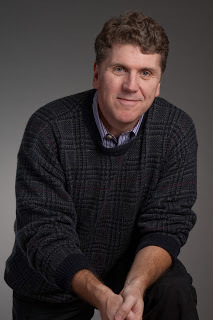
Robert Koon
Hometown: I’m an Air Force brat, so this is a tough question. I was born in Harlingen, Texas, grew up mostly in central California, and there are also odd sprinklings of Virginia, Louisiana, South Carolina, Georgia, Arkansas, Alabama, and Oklahoma.
Current Town: Chicago. I’ve lived here longer than anywhere else, so that’s where I say I’m from.
Q: What are you working on now?
A: Rewrites of three plays (HOMECOMING 1972, CYCLIST ATTACKED BY MOUNTAIN LION, and THE GREEN COMMAND, plus notes on a new one. I’m also working on a fifth of Jameson’s.
Q: How would you characterize the Chicago theater scene?
A: Everyone uses the word “community,” and it’s the perfect word to use. People are conscious of being in a community, of how the success of the community benefits everyone. Companies work together, individual artists cross the boundaries of company affiliation fairly easily, people always go to see other people’s shows, relationships are tremendously important. I don’t know whether this is a product of the Chicago focus on the ensemble, or whether the focus on the ensemble is a natural product of working in a community, but people work together—fairly successfully for the most part. Which is really how it should be, and it’s always a surprise when I go somewhere else and find that it doesn’t really work that way all the time. Successful communities support each other, and Chicago’s community is pretty successful.
Q: Tell me, if you will, a story from your childhood that explains who you are as a writer or as a person.
A: When I was a kid we moved a lot, every year it seemed, and it was difficult to feel a sense of belonging, of rootedness. And my grandmother would come visit and tell me stories of growing up in western Oklahoma in the time when it was still basically the frontier (pre-WW I), and even though that time was far removed from where we were I still felt connected to the time, rooted in the place, and part of those people. I think that’s still what drives me—the need to tell stories to find connection with the times, with a place, and with people.
Q: If you could change one thing about theater, what would it be?
A: That more people could get paid decently for their work, even if it means that fewer get paid exorbitantly. That people who deserve to have their work seen would have their work seen, regardless of gender, age, or ethnicity. That an ethic that says that the work is more important than the building was more widely held. That literary offices were not the first things to go when there are financial challenges. That informed and engaged criticism were the rule rather than the exception. OK, that’s five things, but if I have the power to change things about theater I’m not stopping at one thing.
Q: Who are or were your theatrical heroes?
A: I don’t know what it means to have a hero, really, but whenever anyone asks me that question the name Horton Foote always comes to mind. Of course, there is a lot of other work I admire, by a lot of different people—writers, actors, directors—but I don’t know if I would attach the word “hero” to them. Of course, if you think of a hero as someone who has great visions and dares great things in the face of some pretty steep odds, then you can find heroes in any theatre anywhere. And I don’t care if that sounds like pandering—if the people around you don’t inspire you, you really need to start hanging around with new people.
Q: What kind of theater excites you?
A: Theatre that embraces a sense of the unpredictable. When a character in a play does something that seems 100% opposite to what you might expect, and yet you see that of course it was the only thing they could do, that’s a Wow moment for me. Then, anything can happen. I like ragged edges, I like knowing that it’s all happening in front of me and feeling like it’s the first time it ever happened and no one knows what’s coming next. People are unpredictable and contrary, and when characters are unpredictable and defy expectation—and it works—then that is tremendously exciting. Live performance lives more in the moments where it’s not perfect than where it is, and while we always try to get it right the gap between our ability to aspire and our ability to achieve is where the humanity comes into our work. Transcendence lives in that gap, and when we are able to make that leap, that’s amazing.
Q: What advice do you have for playwrights just starting out?
A: Hmmm…how about “Go slam your hand in a car door, because trying to live by using your fingers is just going to cause you pain and you might as well get used to it.” Maybe that’s not entirely inspiring or informative, though…
See lots of plays. Read. Write lots, even if you don’t think it’s good. Remember that when you stop trying to make everything perfect you have a much better chance of actually being good. Study acting—theatre is an actor’s medium, and the thing that gets an audience from “Lights up” to “End of play” is not our wit, or our poetry, or the great social themes we embrace, but rather the relationship they form with the people on stage. Giving characters things to do is more important than giving them things to say. Every writer hates their work at some point—do the work anyway. Finish your plays--the big difference between writers who get produced and writers who don’t is that writers who get produced finish their plays. Then they send them out—that is important, too. If you wait until it’s perfect, you’ll never get anything done.
Q: Plugs, please:
A: ODIN’S HORSE just closed in Seattle, so the next thing is HOMECOMING 1972, opening this spring at Chicago Dramatists.







Published on November 15, 2012 15:08
November 14, 2012
I Interview Playwrights Part 526: Ron Hirsen
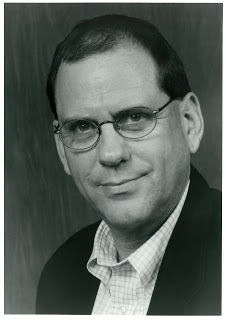
Ron Hirsen
Hometown: Chicago
Current town: Chicago
Q: What are you working on now?
A: I'm preparing to self-produce a play of mine in Chicago next year. The play, Elegy, has had readings in Chicago and New York and was produced in Philadelphia a number of years ago but has never had a production in Chicago. I am confident that there is an audience for this play here, and, to paraphrase the old saying, if you want something done-- at all, you have to do it yourself. So, here I go.
Q: How would you characterize the Chicago theater scene?
A: Theater people in Chicago are enormously generous and supportive of their fellow theater artists. We all want each other have the chance to do work, to get produced, to succeed and feel satisfied with our work. I don't think this goes on in quite the same way anywhere else, certainly not in New York or LA.
Q: Tell me, if you will, a story from your childhood that explains who you are as a writer or as a person.
A: When I was a child, my mother would take my brother and me to the Goodman Children's Theater, which is now called Chicago Playworks at DePaul's Merle Reskin Theater. The productions featured students of what was then the Goodman School of Drama, and I thought they were wonderful. I remember Rip Van Winkle waking after years of slumber, Tom and Huck hiding under a bench as they attended their own funeral, and other delightful moments in the theater. The old Goodman Theater had a gold asbestos curtain, which remained lowered, masking the set behind it, until right before each performance was about to begin. Before the house lights would dim, the gold curtain would begin slowly to rise. I used to love to watch that curtain ascend ever so slowly and wait in eager anticipation to see what was behind it. That curiousity about what's about to take place has remained with me ever since. Whenever I am sitting in a theater waiting for a play to begin, the sense of the wondrous possibilities is palpable and exciting. I will never tire of it, and I try always to keep it in mind as I imagine and write plays.
Q: If you could change one thing about theater, what would it be?
A: American theater needs vastly greater government subsidy. It costs way too much to see a play, theater artists struggle way too hard to earn even a modest living, and way too many worthy plays never see the light of day because no one will risk producing them when costs are so high.
Q: Who are or were your theatrical heroes?
A: Writers, mostly. Anton Chekhov because of his enormous compassion for his characters, Eugene O'Neill because of the magnitude of his vision and the depth of his emotion, Tom Stoppard because he's so damn smart, August Wilson because he completed such an ambitious cycle of plays (he could really write a scene, too), Arthur Miller because he wrote Death of a Salesman, and Tony Kushner because he wrote Angels in America.
Q: What kind of theater excites you?
A: Theater has to be intimate, human in scale, immediate and communal. The most exciting moments in the theater occur when everyone in the room, actors, musicians, audience, all think the same thought or feel the same passion at the same instant. When that instant occurs, it is most thrilling, inspiring, uplifting, and delightful. It doesn't happen often, but whenever it does, it renews my enthusiasm for the theater and makes me want to go see a play.
Q: What advice do you have for playwrights just starting out?
A: Don't do it. If there is anything else in the world that can make you happy, do that instead. If not, read as many plays as you can, see as many plays as you can, and act.
Q: Plug:
A: Please keep your eye out for Elegy about a year from now, in a production directed by Victory Gardens Artistic Director Emeritus Dennis Zacek featuring a strong cast of accomplished Chicago actors. The play, about a Holocaust survivor and his son, will be presented as a Holocaust and survivor awareness program in part as a benefit for the Illinois Holocaust Museum in Skokie. The production will coincide with the 75th anniversary of Kristallnacht, the November Pogroms of 1938.
Those interested in supporting this enterprise can make tax-deductibe contributions to The Elegy Project, Inc. Just contact me by email: ronhirsen@gmail.com. Thank you.







Published on November 14, 2012 06:26
November 13, 2012
I Interview Playwrights Part 525: Jayme McGhan
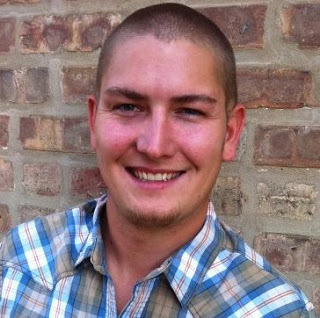
Jayme McGhan
Hometown: Minneapolis.
Current Town: Chicago. Technically, Elmwood Park, which is the first village over on the West side. I know a bunch of proud Chicagoans that would give me hell if I didn’t own up to that.
Q: What are you working on now?
A: Lots of revisions for plays I’ve written in the last few years that I haven’t had time to rewrite.
I have a reading of a show called “Damn the River Deep” at Chicago Dramatists this month.
I’m also currently writing and doing pre-production on a feature-length film for Revision Entertainment that I will be co-directing. It’s a heist/adventure/wilderness survival flick set in the Canadian Rockies. The whole film crew will be backpacking for two weeks and shooting as we go, which should prove to be either straight genius or completely moronic. There is something to be said for working on a project where you have to carry a .44 caliber cannon on your hip in case a grizzly attacks.
Q: How would you characterize the Chicago theater scene?
A: There are so many places at the theatrical table if you’re willing to work hard. Theatre artists bust their butts in this city. They go hard all the time. I love that about this place. I also love the fact that almost every Chicago theatre artist I know is talented in multiple disciplines. It’s an artistic evolution out of necessity. I don’t know anyone who is just a really good actor. I know a lot of really good actors who also happen to kill at costume design or administration or what have you.
Q: Tell me, if you will, a story from your childhood that explains who you are as a writer or as a person.
A: I was a serial liar when I was a kid. And I was pretty good at it. I told my second grade class that I went to Australia to cage dive with Great White Sharks and that I was almost eaten by a twenty-footer. I must have been crazy convincing because the class talked about it for a long time. One of the kids went home and told his mom, who then called my mom to get travel advice about where to stay in Sydney. My mom was like, “Jayme’s been to the Florida panhandle. A few years ago. I wasn’t aware that he even knew Australia existed.” At some point the lies transformed themselves in to stories that needed to be told in a different medium; mostly because I was sick of being grounded.
Q: If you could change one thing about theater, what would it be?
A: The American Theatre’s attempt to create a culture of celebrity. Let’s just stop that. Hollywood is really good at this. We’re not. In one month’s time my Intro to Theatre students will not be able to tell you who David Lindsay-Abaire is even after seeing his show at Steppenwolf and talking about it for two class periods. My folks really liked Joe Dowling’s production of Brian Friehl’s The Home Place at the Guthrie a few years ago but I’ll stake my yearly playwriting earnings (that was a joke) that they have no idea who Joe Dowling is--and that dude has a road named after him! My grandmother might be able to tell you who Bernadette Peters is but I seriously doubt it. You know what they can tell you? All of them can tell you who won “Dancing with the Stars” last night.
Let’s just let Hollywood keep its culture, shall we?
Q: Who are or were your theatrical heroes?
A: Shaw. Williams. O’Casey. Boucicault. Pinter. Albee. To name a few.
Gary Garrison is heroic to me. Gary is out there every day advocating for playwrights. I think every writer I know also knows and loves Gary. That pretty much says it all.
I had a dude crush on Eric Bogosian for a very long time. I still do to some extent. When I was a sophomore in college I wrote to him a few times to ask for some advice on creating solo shows. He took the time out of his no-doubt crazy busy schedule to write back to a nineteen year old kid who had all the drive in the world and absolutely no craft. That was pretty nifty.
Q: What kind of theater excites you?
A: Big, Bold, and Challenging. I love stories that hang their hat equally on both language and plot. I like words strung together in a manner that takes your breath away. If you couple that with a moving dramatic arc that has something unique to say about our collective existence then you’ll have a fan for life. I dig spectacle, style, and experimental form as much as the next theatre-goer, but if that’s all your play or production is relying on then count me out.
Q: What advice do you have for playwrights just starting out?
A: Don’t spend all of your time in front of the computer. If you’ve made the decision to be a playwright then also make the decision to become a committed networker. If you can add a sound understanding of marketing and arts-related business to the pile, all the better. Also, learn how to use a drill and a circular saw. Seriously.
Q: Plugs, please:
A: I’m a Resident Playwright at Chicago Dramatists and an Associate Artist at Stage Left Theatre. Both are amazing groups of talented people. Show them some love the next time you’re in Chicago.
I’m also an Assistant Professor of Theatre at Concordia University, Chicago where I get to work with some of the brightest and most talented up-and-coming theatre artists in the city. We’ve always got something kicking around.
And because I love my hometown, check out Yellow Tree Theatre in the Twin Cities. Good friends who make lovely theatre.
And because I love my fellow Chicago writers, check out the plays of Barbara Lhota, Andrew Hinderaker, Dana Lynn Formby, Ike Holter, Randall Colburn, Rohina Malik, Steve Spencer, Mia McCullough, Martin Zimmerman, and Reggie Edmund.







Published on November 13, 2012 07:32
November 12, 2012
I Interview Playwrights Part 524: Timothy Nolan
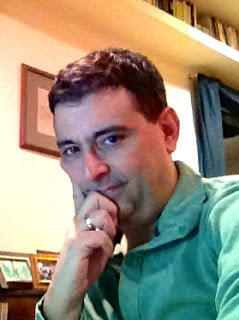
Timothy Nolan
Hometown: Bronx, NY by way of Mahopac, NY
Current Town: Brooklyn, NY
Q: Tell me about What's In A Name.
A: What’s In A Name started off as a short play I wrote in 1994 that was loosely based on the Katherine Ann Power story. A young woman is conned into committing a terrible criminal act, and has to make life- altering choices in order to survive, but doesn’t realize until years – really decades – later just how life-altering they were.
What’s made working on this play fascinating is the experience of getting older along with the character. A person living under an assumed identity for 15-something years is interesting, but a person living that way for, say, 40 years is infinitely more compelling. Because your life goes on, usually when you’re not looking, and you continue to make choices, and those choices pull you down a road that you may not even know you are on, until its too late. The story in What’s In A Name is unique, but in a lot of ways I found myself identifying with it in ways I couldn’t even imagine when I first wrote it years ago. The idea that you get to a certain age and think, like David Byrne said, “how did I get here?” And can I keep going in this direction? Should I, even? And what is the price of trying to unspool things?
When Susan, the main character, who hasn’t had a good night’s sleep in forty years, drops her guard and wanders into a bar because she’s reached a point of exhaustion, she sees that she can’t put off dealing with these things any longer. From there, we’re off.
Q: What else are you working on now?
A: Couple of things. I always try to have a few ideas in the hopper. I invite them in and see which choose to stay.
Q: Tell me, if you will, a story from your childhood that explains who you are as a writer or as a person.
A: I’m not sure that I have one. I started writing because when I was twelve I wanted to write James Bond movies. I got into theater in ninth grade when a girl I had a wicked crush on asked me to audition for “Arsenic and Old Lace.” It was probably the longest conversation we had. (I got the part, though.) I’m not sure what this says about me or the work, beyond that I still have a 007 screenplay in my desk and that I owe a lot to Ann Marie Giordano.
I do remember one interesting little tale from my teenage years in Mahopac, NY. We had a deacon at our church, young man, very nice, very energetic. First priest or deacon at our church under fifty in a long time. Opened the gym three nights a week so we could play basketball. Killer under the boards. Before too long, everyone in town loved him. Understand that about eighty percent of Mahopac went to this church. So one day, he’s just gone. Gone. Poof. People asked after him, nothing. No explanation, no goodbye, no thanks for the memories. Just a hole, a void of information. And what I learned is just how fast and how madly people will rush to fill that hole. He was with a boy. He had a fight with the Bishop. He discovered something bad in the rectory and wouldn’t keep quiet. He was gay. He was a spy (the 007 fan liked that one best). And these were not the town crazies, they were the people you talked to all the time. In the absence of truth, people will invent their own. Sometimes it’s amusing, sometimes it’s dangerous, but it’s never good. I find a lot of my stories all seem to roll back to what people will do in the absence of truth.
Q: If you could change one thing about theater, what would it be?
A: I’m probably not breaking any new ground here, but the balance between art and commerce is way out of whack. It’s so hard to go to Broadway now, and not for the reasons you think. If you will allow me to digress…
When I go on vacation, I want everything to be perfect. I want nice weather, I want good meals in whatever restaurants I go to, I want any activity I undertake to be just right. Nothing disappointing. So if my vacation was to come to New York City and see theater, I want to make sure it’s perfect, and by gosh, it’s gonna be.
The last two Broadway shows I saw…I won’t say which ones…were good, but they didn’t change my life. And yet, as soon as the final number ended, everyone around me was on their feet applauding like their seats were on fire. Everyone around me is standing and applauding, screaming and flapping. Now, there are worse sins in the world than standing for an ovation that hasn’t quite been earned, so up I go. But it’s not real. It’s almost like the standing ovation is just part of the performance. And I can’t blame folks for acting this way, because this is their vacation and their experience and they spent the money and they spent the time and they’re gonna believe it’s amazing, even if it isn’t.
So what’s happened here is the commerce has so taken over that the art doesn’t matter anymore. That’s how it’s been promoted, that’s how it’s being played, that’s how it’s being received. And that’s very bad for theater in this country, because from Broadway it will only seep down to off-Broadway and regional theaters as they conclude it’s the only way to make money.
Theater needs art and commerce (that’s why it’s not “show art”), but when the commerce gets so far out in front of the art, you have results like this. And it can’t be sustained. After all, what will there be to revive in twenty years?
We need to do a better job building audiences and improving the business model, and most of all getting away somehow from the idea that’s it’s an offense against vacations to take a chance on a show that might not be a sure thing.
Q: Who are or were your theatrical heroes?
A: Samuel Beckett and Thornton Wilder. Any theater artist who finds a way to harness the form to increase its impact on the audience.
Q: What kind of theater excites you?
A: Whenever the form of live theater is used to extract the power of the story. Theater provides what other media cannot… the chance to be in the room with the drama, the chance to feel it as opposed to just seeing and hearing it. The power of a simple story well told.
Q: What advice do you have for playwrights just starting out?
A: If there’s one thing I wish I had been told when I first started, it’s that this is really hard work, real day-in and day-out work, and it’s impossible to do alone. So find the community. Make sure you have artistic kindred spirits around you for support and to keep you accountable. People who, if you say you’ll have a new scene Tuesday, will actually be disappointed if you don’t have a new scene Tuesday. Because you need to work at your writing every day, every damn day, or its not going to happen. And the only way to see your way through that is to be among others. It brings the work out of your head and into the world where it can grow. It’s like raising a child. A play is only finished when it’s not yours anymore, when it can stand in the world on its own. That doesn’t happen if it never leaves your desk.
Q: Plugs, please:
A: Sure!
Variations Theatre Group (variationstheatregroup.com) is putting up this version of What’s In A Name as part of their Harvest Festival, and the reading is November 18th (a second date is TBD). They’ve just turned an old factory and former crack house in LIC into the Chain Theatre; we’ve been rehearsing there and it’s beautiful. We’ve had so many theaters cut down in New York over the past few years, it really is wonderful to see one break the surface and grow. I’m hoping to continue working with them.
Of course you can check out my earlier plays at Indie Theater Now, Martin Denton’s wonderful publishing house of e-plays (is that a word?). Acts of Contrition, The Way Out, Wrong Barbarians, and NotDark Yet are all available for perusal and purchase.
Latest news and info is always up on my site.







Published on November 12, 2012 05:11
November 10, 2012
I Interview Playwrights Part 523: Steve J. Spencer

Steve J. Spencer
Hometown: Dayton, OH
Current Town: Chicago, IL
Q: What are you working on now?
A: Couple of plays. One is about a brilliant fourteen-year-old girl being slowly crushed by our culture. Another is about a suicidal game show host. Another is a Winesburg, OH rip-off about bath salts and squatters. Doing readings of three other plays, too.
Q: How would you characterize the Chicago theater scene?
A: Inaccurately. There seems to be a hierarchy, a strict food chain of who is cool and successful and who is beneath contempt. But once you climb the ladder to the next level, you're left puzzled: there seems to be a hierarchy on that level, too, made up of a strict food chain and hapless losers. I suspect the next level up is like that as well. An illusion of class and status at each level, when in reality, we're just a bunch of people contorting ourselves into what we think are appropriate postures. Sure, some people on higher levels shit on you, and some are decent, unpretentious folk. Mostly, we've replicated the same bullshit status system we became artists to escape from, primarily because it's ingrained in us by age four. It is a persistent illusion. And most of us know it. Yet we still act like it's real. Or at least I do.
Oh, and someone said Hollywood is like high school with money. Theater is like high school without money. Bullshit status we know is false but are too afraid to disregard.
And the cool kids in the theater cafeteria deserve our compassion as well.
Q: Tell me, if you will, a story from your childhood that explains who you are as a writer or as a person.
A: Okay. My dad is the best man alive. Kind. Funny. Has worked himself to death his whole life. Growing up, something unfair happened, something that was not his fault. We almost lost him because of it. I was young and I couldn't figure out how such a decent man, a real Father, could be destroyed for doing nothing wrong. It didn't so much as leave me with a sense that life was unfair, it left me with a sense that our way of life is insane. It doesn't work. Look around. Not working. And at the heart of it is inequality.
Q: If you could change one thing about theater, what would it be?
A: Fire Chris Jones. Seriously. He can't write, and he can't write because his taste sucks so he spends the majority of his reviews trying to justify his own taste. It's gotten to the point where he cannot successfully describe the plot of a play because he lacks conviction in his own taste. Which is his only job. His authority is just another illusion, like the theater hierarchy or like money; if we don't believe in him, he'll go away. If he were fired all the church bells in Chicago would ring forever.
Q: Who are or were your theatrical heroes?
A: William Sayoran, John Osborne, lots of people. But nobody has influenced me more as a writer than my dad. A kind human.
Q: What kind of theater excites you?
A: I want to see theater about something. It doesn't have to be political. It doesn't have to be about a social problem. That'd be nice, considering we're going to shit, but it doesn't even have to be about love. Tell me something that you have to tell me. I often leave the theater and go home and read, say, Milan Kundera and get really sad. I pick up Kundera and he tells me about his life. He tells me what it was like to be a human at his point in existence. He tells me something human. The difference between reading Kundera and seeing most plays is shocking. Most of the plays I see tell me nothing. And not every play has to be about something; it can just be about itself, it can just be entertaining. That's fine. But we have plenty of entertainment. Tell me something that it will kill you not to say.
Q: What advice do you have for playwrights just starting out?
A: Art will not save you. Your career will not save you. It will not keep you warm at night. I wish teachers would tell us that. Art is not the most important thing in the world. It's not more important than the people in your life. That's all you have. I've learned that the hard way.
Other than that, you are free to do whatever you want. If an AD says "we can't do that," please remind him or her that we can and should do whatever the hell we want. "We can't do that." Wrong. We're free. To do whatever the hell we want. You could punch your boss, God won't stop you. You could even produce an unmarketable play.
Oh, and take the traditional trajectory to becoming a playwright (school, MFA, connections, form company). It's a clear-cut path. Just try to say something while you're at it.
I hope I don't come off as too bitter. Eh. So be it. I'm nice in person. Where it counts.
Q: Plugs, please:
A: at the Chicago Dramatists: January 12 Annual Showcase of the NEW Resident Playwrights
FLOATER by Stuart Flack
EARTHQUAKE CHICA by Anne García-Romero
A WORK OF ART by Elaine Romero
INVISIBLE THERAPY FOR THE IMPOSSIBLE WORLD by Steve J. Spencer
and
February 23 MAY YOU LIVE IN INTERESTING TIMES by Steve J. Spencer







Published on November 10, 2012 06:01
November 9, 2012
I Interview Playwrights Part 522: Carolyn Kras
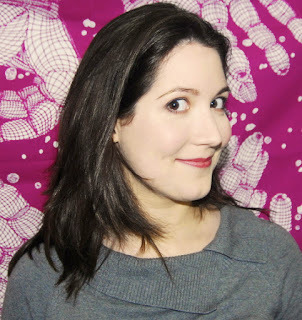
Carolyn Kras
Hometown: Berwyn, IL (just outside Chicago)
Current Town: Los Angeles
Q: What are you working on now?
A: I’m working on the “Visionary Playwright Commission” from Theater Masters. The play is about a young couple who buys a foreclosed house and is forced to live with strangers when the previous owners won’t move out. This situation is happening across the country due to deceptive bank practices and the long wait times for eviction notices. I wondered what it’s like when people live with housemates they’re trying to kick out.
My historical drama screenplay Magnetic is also in development. It was recently showcased at the Hamptons International Film Festival where Melissa Leo headlined the reading.
Q: Tell me, if you will, a story from your childhood that explains who you are as a writer or as a person.
A: When I was a kid, I once woke up to a loud explosion that turned out to be a bomb. A neighborhood restaurant was blasted to pieces, probably by the mafia, which was very active at the time. Luckily, no one was injured since it was early morning and the place was closed. I used to sell school fundraising items, like candy bars, to the restaurant’s owner, and I started to wonder if this benevolent man who liked helping the school was involved in shady dealings or was merely a victim. I suppose this incident helps explain why I’m interested in the extreme actions people take to get or keep power.
Q: Tell me about the Artery Playwrights Project.
A: It’s a new theatre company in Los Angeles that produces the work of its founding playwrights – Dean Poynor, Brian Forrester, and me. This year we produced Linthead, one of Brian’s plays that theatres wouldn’t touch because it required nine actors. So we raised the money on Indiegogo and put it up ourselves. It received a lovely Los Angeles Times review, and an investor is raising money for a commercial production. Rob Handel of 13P was our professor at Carnegie Mellon and advocated that self-production creates more opportunities. We’re planning the next production now.
Q: If you could change one thing about theater, what would it be?
A: We need to find creative ways to make the tickets cost less or else theatre will lose future audiences. One initiative that worked for us was asking donors to donate tickets to audience members who couldn’t afford them. We gave out 80 free tickets from this drive.
Q: Who are or were your theatrical heroes?
A: Tom Stoppard, Lynn Nottage, Aeschylus, Edward Albee, Richard Greenberg, and Carter W. Lewis – the list goes on.
Q: What kind of theater excites you?
A: A gripping story, the kind where you can feel the audience leaning forward the whole time.
Q: What advice do you have for playwrights just starting out?
A: Write, see new shows, and find collaborators who appreciate your voice. Consider attending an M.F.A. program and/or interning in a literary manager’s office. I read close to a hundred new plays when I was an intern, and that was a great education.
Q: Plugs, please:
A: The new play commissioned by Theater Masters will have a reading at a prominent theatre (TBD) in 2013. You can check my web site, www.carolynkras.com, for updates.







Published on November 09, 2012 07:27





















